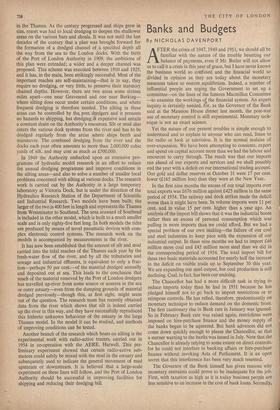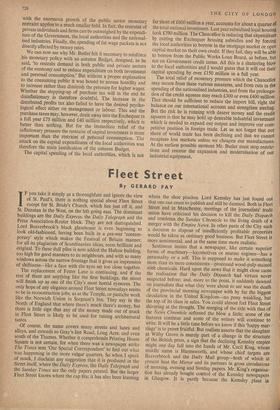Banks and Budgets
By NICHOLAS DAVENPORT FTER the crises of 1947, 1949 and 1951, we should all be familiar with the nature of the trouble besetting our Yet the nature of our present troubles is simple enough to understand and to explain to anyone who can read, listen to the radio or look at television. It is the normal malaise of over-expansion. We have been attempting to consume, export and spend on capital account more than we had the labour and resources to carry through. The result was that our imports ran ahead of our exports and services and we shall possibly end the year with a deficit on our international trading account. Our gold and dollar reserves at October 31 were 17 per cent. lower (£165 million less) than they were at the New Year.
In the first nine months the excess of our total imports over total exports was £676 million against £425 million in the same period of 1954. The railway and dock strikes made the deficit worse than it might have been. In volume imports were 11 per cent. and in value 15 per cent. higher than a year ago. An analysis of the import bill shows that it was the industrial boom rather than an excess of personal consumption which was pulling in more imports than we could afford. But we had a special problem of our own making—the failure of our coal and steel industries to keep pace with the expansion of our industrial output. In these nine months we had to import £46 million more coal and £45 million more steel than we did in the corresponding period of 1954. The total import bill for these two basic materials accounted for nearly half the increase in the deficit on visible trade up to September 30 this year. We are expanding our steel output, but coal production is still declining. Coal, in fact, has been our undoing.
The Chancellor has had a more difficult task in trying to reduce imports today than he had in 1951 because he has pledged himself not to go back to import restrictions or to reimpose controls. He has relied, therefore, predominantly on monetary technique to reduce demand on the domestic front. The first cautionary rise in Bank rate in January was ignored. So in February Bank rate was raised again, restrictions were imposed on hire-purchase finance and the money supply of the banks began to be squeezed. But bank advances did not come down quickly enough to please the Chancellor, so that a sterner warning to the banks was issued in July. Note that the Chancellor is already relying to some extent on direct controls. for he could not interfere in banking affairs or hire-purchase finance without invoking Acts of Parliament. It is an open secret that this interference has been very much resented.
The Governor of the Bank himself has given reasons why monetary restraints could prove to be inadequate for the job. First, with taxation as high as it is today business people are less sensitive to an increase in the cost of bank loans. Secondly, with the enormous growth of the public sector monetary restraint applies to a much smaller field. In fact, the restraint of private individuals and firms can.be outweighed by the expendi- ture of the Government, the local authorities and the national- ised industries. Finally, the, spending of fat wage packets is not directly affected by money rates.
We can now see why Mr. Butler felt it necessary to reinforce his monetary policy with an autumn Budget, designed, as he said, 'to restrain demand in both public and private sectors of the economy and to reduce expenditure on both investment and personal consumption.' But without a proper explanation to the consuming public it was bound to arouse hostility and to increase rather than diminish the pressure for higher. wages. Whether the stepping-up of purchase tax will in the end be disinflationary is therefore doubtful. The increase in the distributed profits tax also failed to have the desired psycho- logical effect either on management or labour. This and the purchase taxes may, however, drain away into the Exchequer in a full year £75 million and £40 million respectively, which is better than nothing. But for the immediate relief of the inflationary pressure the restraint of capital investment is more important than the restraint of personal consumption. The attack on the capital expenditures of the local authorities was therefore the main justification of the autumn Budget.
The capital spending of the local authorities, which is not far short of £600 million a year, accounts for about a quarter of the total national investment. Last year subsidised local housing took £390 million. The Chancellor is reducing that expenditure by cutting the Exchequer housing subsidies and by forcing the local authorities to borrow in the mortgage market or open capital market on their own credit. If they fail, they will be able to borrow from the Public Works Loan Board, as before, but not on Government credit terms. All this is a shattering blow to the local authorities and I would guess that it will cut their capital spending by over £150 million in a full year.
The total relief of monetary pressure which the Chancellor may secure from these various measures, and from cuts in the spending of the nationalised industries, and from the prolonga- tion of the credit squeeze may reach £300 or even £400 million. That • should be sufficient to reduce the import bill, right the balance on our, international account and strengthen sterling. But the risk he is running with dearer money and the credit squeeze is that he may hold up desirable industrial investment which is needed to expand our output and improve our com- petitive position in foreign trade. Let us not forget that our share of world trade has been declining and that we cannot recapture lost markets unless. we cheapen our manufactures. At the earliest possible moment Mr. Butler must stop restric- tions and resume the expansion and modernisation of our industrial equipment.



























































 Previous page
Previous page